22nd October 2008 : Chemical Contamination or Algal Bloom?
 Wednesday, October 22, 2008 at 08:45PM
Wednesday, October 22, 2008 at 08:45PM You'll know from my previous post that the river has been rising over the past couple of days, but I want to take you back a month, to the 20th September, when the river was very very low and flowing so slowly you could be forgiven for thinking it was stagnant.
It was a hot, balmy afternoon when we noticed a few dead fish washed up on the riverbank...enough for us to raise an eyebrow, but no real cause for alarm.
Sunday morning, the 21st, was a different story: we awoke to find the riverbank littered with dead fish, and scores more floating by, white bloated bellies to the sky, every size and type of fish the river had raised and nurtured. It was a horrific sight. I'm showing you so many photos of the poor dead fish to try to give you an idea of the scale of it all:
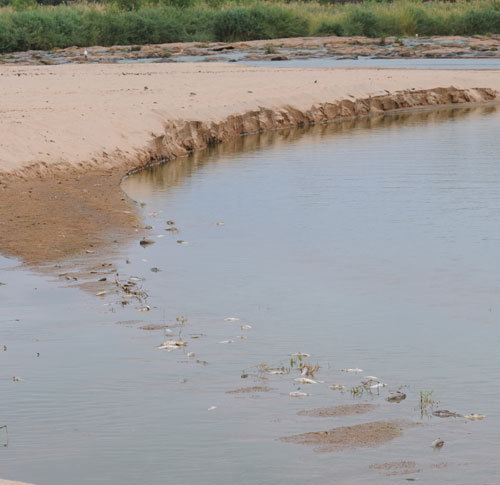
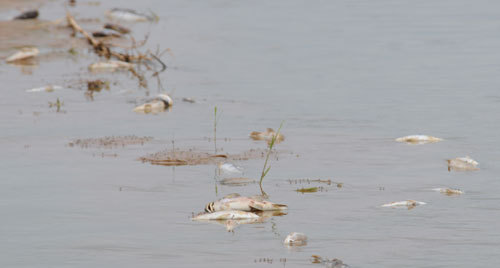
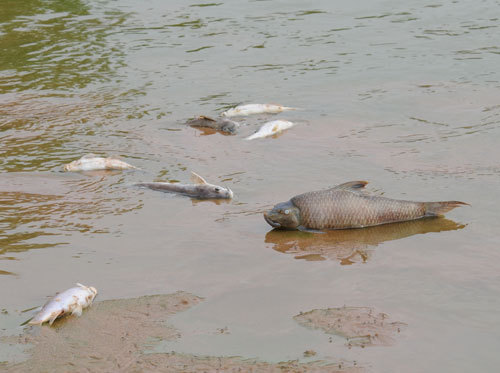
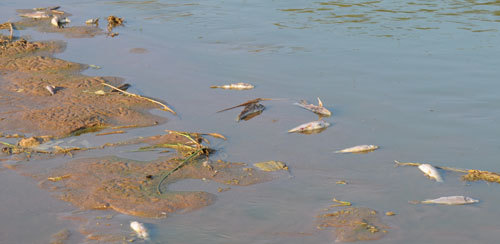
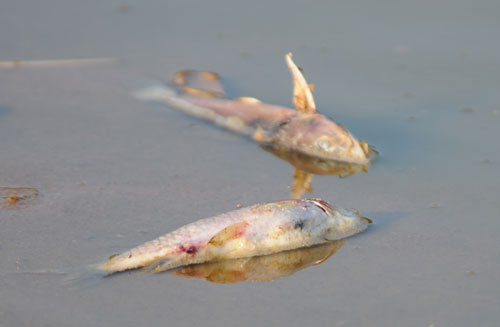
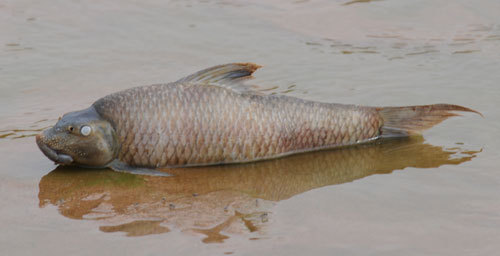
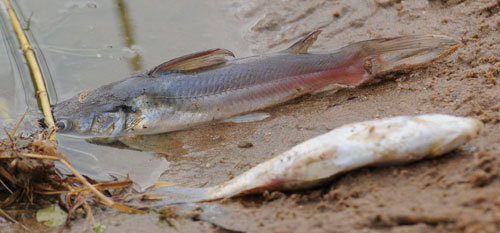
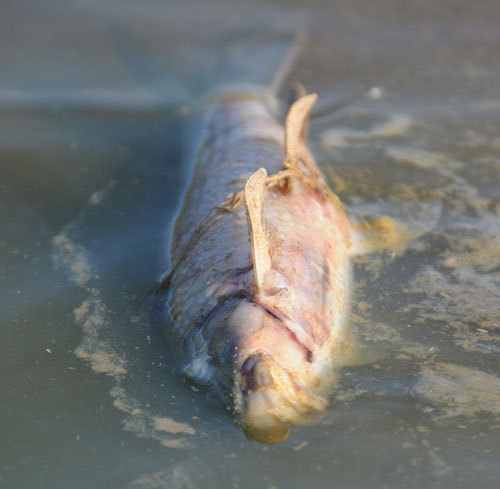
I watched a young crocodile follow and investigate a fish as it drifted downstream, seemingly about to snap it up in its fearsome jaws, but then it turned and swam away, as if in disgust, and let the fish float onwards downstream:
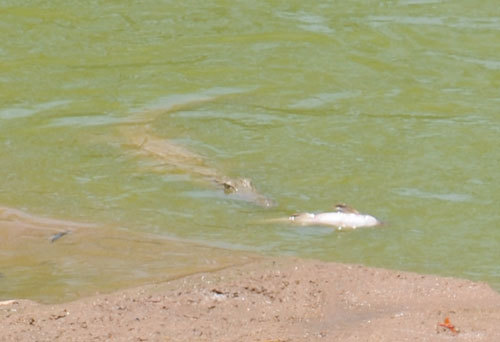
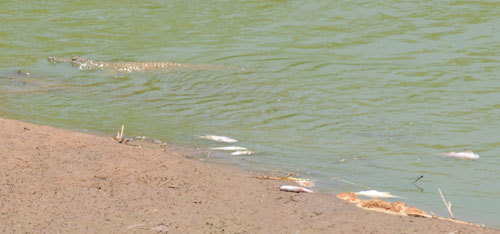
Overnight, a group of four Pink-backed Pelicans had arrived. The last time we saw Pelicans here was back in February. Unlike those earlier visitors which were either juvenile birds or adults not in the mood for procreating, these ones were adult birds coming into full breeding plumage, with their sunflower-yellow pouches.
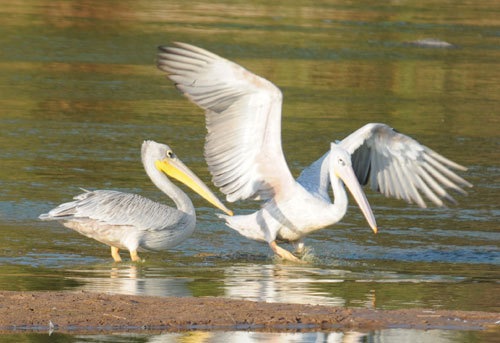
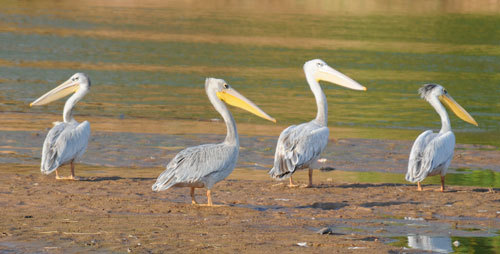
We all know Pelicans are fish-lovers...so why were they not eating any of the dead fish that lay littered all around them?
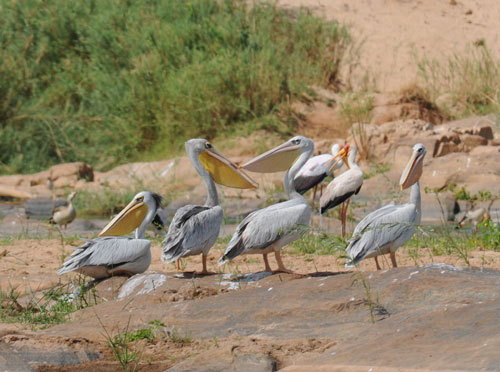
Monday 22nd September and the river was seething with storks - Marabous, Yellow-bills, Woolly Necks - but strangely, many of them were also not touching the dead fish. (You would expect them to be gorging themselves, wouldn't you?).
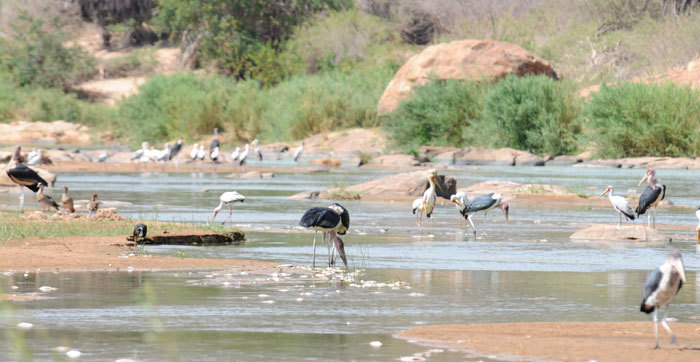
The Yellow-bills would pick up a fish, as if to eat it, then drop it again. The Pelicans were still there but still not appearing to touch the dead fish. Perhaps they were already full up and couldn't squeeze any more in? Or perhaps something more ominous was happening? Did the birds know something we didn't?
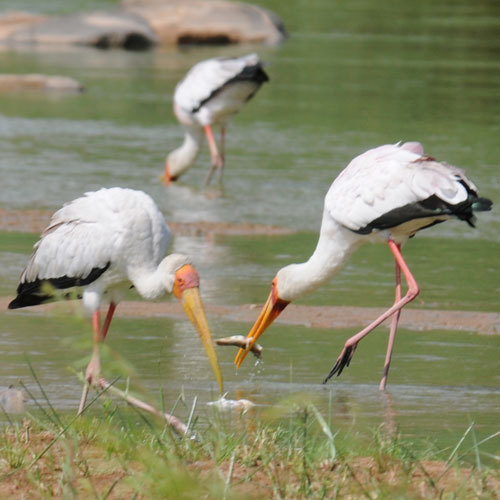 The Yellow-billed Storks were picking up the dead fish but then dropping them again
The Yellow-billed Storks were picking up the dead fish but then dropping them again
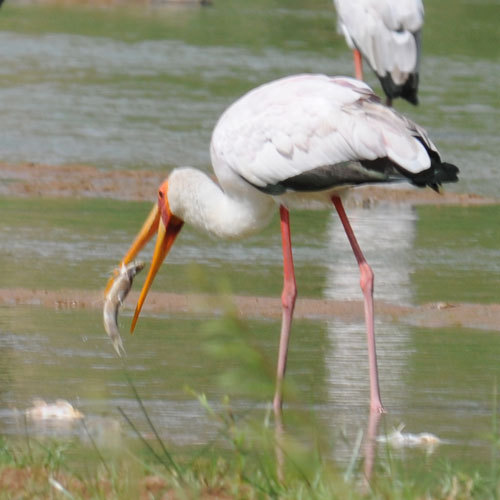
The Marabous, the ultimate scavengers which it has to be said will eat almost anything, were arriving in great numbers and were the only ones eating some of the fish, but without much enthusiasm.
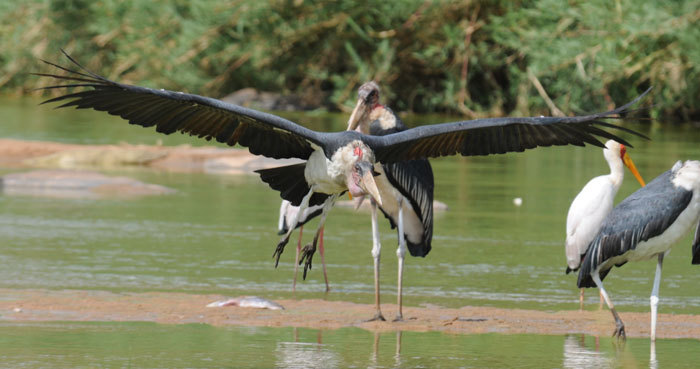
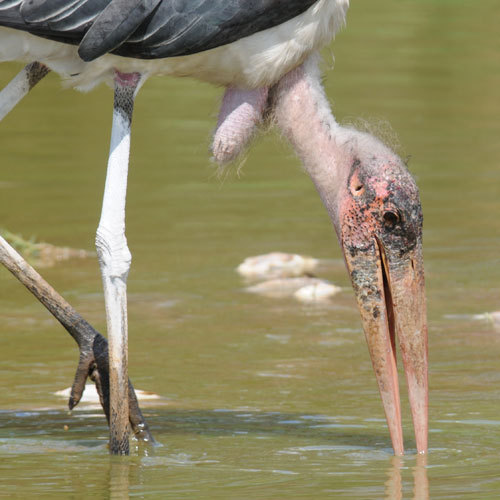
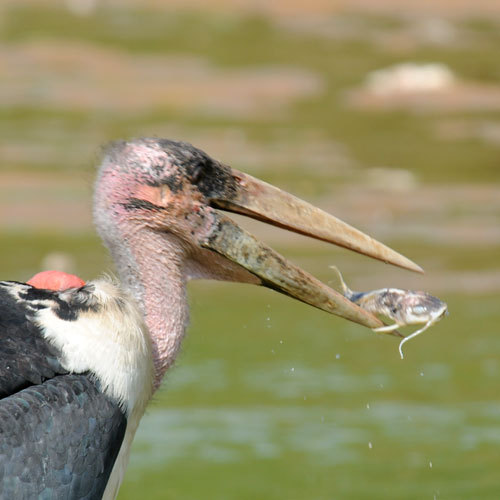
Of great concern to me too was the fact that Ian told me he had seen our Egyptian Geese pecking at some of the smaller fish. This worried me in case the fish were contaminated. (This also surprised me, as I thought geese were exclusively herbivorous...but having said that, close observation of nature does reveal that many creatures eat things you wouldn't expect them to - I think the diets of many animals and birds are partly driven by availability of food and, especially in the dry season when times are tough, they do not stick as closely to their supposed eating patterns as we categorizing humans would like them to - remember the squirrels eating the chicken carcass? And aren't dik diks meant to be browsers? Then why are they devouring large chunks of our lawn grass?)
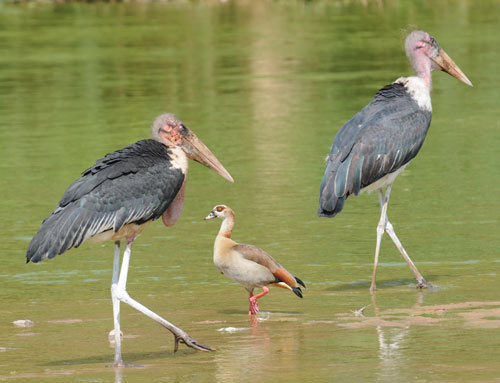 This Egyptian Goose was not intimidated by the presence of so many huge storks
This Egyptian Goose was not intimidated by the presence of so many huge storks
The most worrying discovery of all was that of a large dead crocodile at Hippo Bend, which we noticed on the Monday but which (scouring the background of some of my photos) I realised had already died on Sunday. Ian and our guys went to have a closer look at it, to see if they could see any telltale marks or lesions on the carcass but they could see nothing. Neither was anything eating it, which I thought strange but then my father told me he had seen a crocodile carcass in the Mara and nothing was eating that either, so maybe it's not unusual.
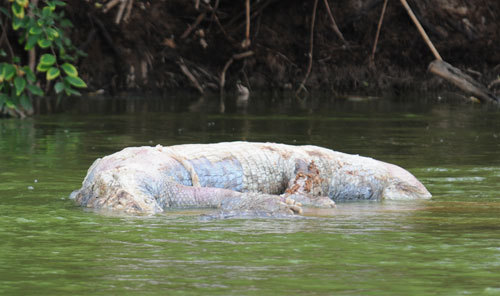
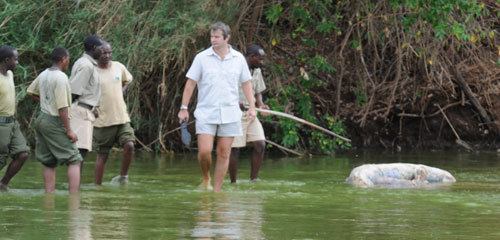
So what on earth was going on with our river? Some of the local Wakamba people allege that this mass die-off of fish happens whenever the sisal plantation upstream dumps chemicals in the river. Other people, who have lived in this area longer than I have, claim it happens every year because of an algal bloom which depletes the river and starves the fish of oxygen. I do know we have a lot of algae in the river at certain times of the year (for one thing, the river turns bright green, and for another, our bath water stinks of it!) But how does that explain the storks, pelicans and the young crocodile not eating the dead fish? Perhaps they were just too full already. But what about the dead crocodile? Of course, it could be coincidence that it happened to die that same weekend that the fish died...but it's the first dead crocodile we've seen in over a year of living here.
We took a water sample and have sent it to Nairobi for testing by the Kenya Wildlife Service, so we'll see whether they come up with any information for us. If this does turn out to be a natural annual phenomenon (perhaps exacerbated by fertilizers or chemicals bleeding into the river further upstream - or perhaps made worse by the water temperature which soars when the river is low and the sun unrelenting?), I certainly do not look forward to a repeat of the tragedy next year.
All the different Dragon Flies, in their gorgeous iridescence, might disagree with me however, for they seemed to be feeding delightedly on the dead fish at the river's edge, their bright colours on the carcasses creating morbidly picturesque imagery...
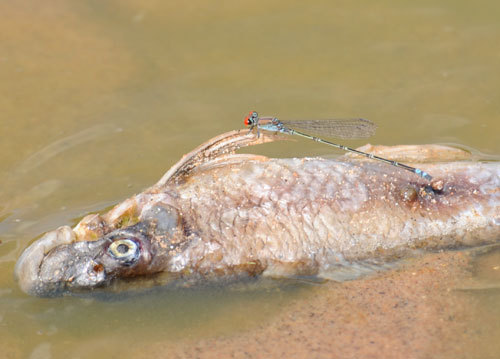
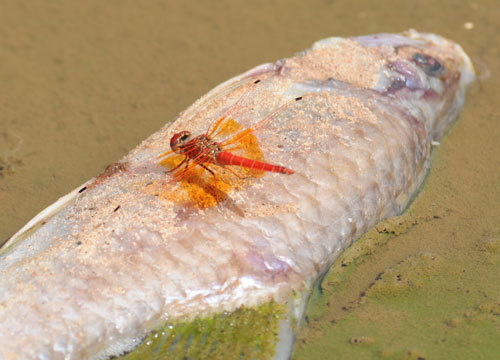
By October 1st, only a few dessicated fish skeletons remained, which the Marabous, true to form, insisting on eating.
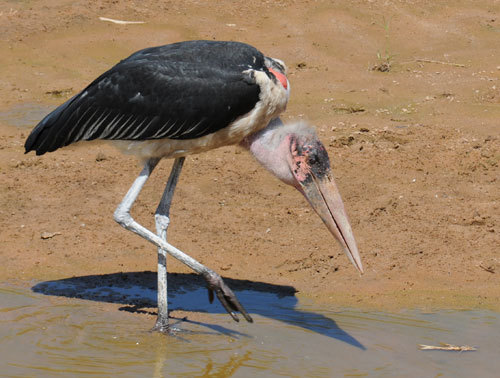
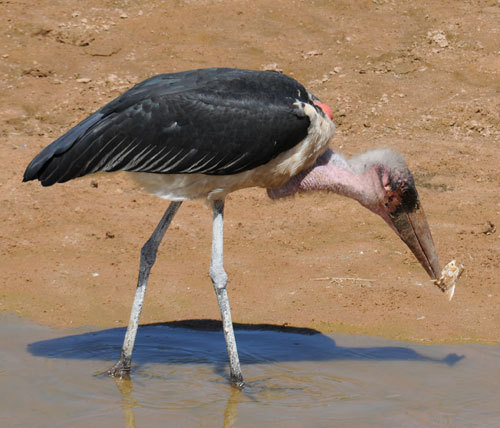
Marabous Storks - like Vultures - may not be pretty, but they do play a vital role in nature by "clearing up the mess", and preventing disease spreading through rotting carcasses. At least - in the end on our sad river, the poor dead fish did not all go to waste - for up and down its course there were dozens of grateful (or at least satiated) Marabou Storks...
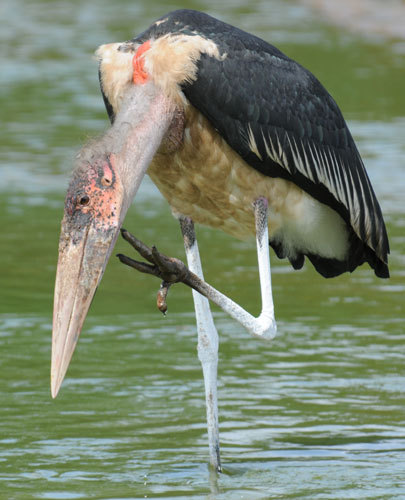 Too much fish makes you itch!
Too much fish makes you itch!
Find me elsewhere on the web:
Dezine Design Creative Hub | My Art & Photos on Gifts & Apparel | Fine Art & Photo Prints |
African Environmental Film Foundation

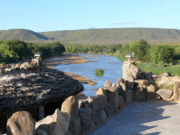
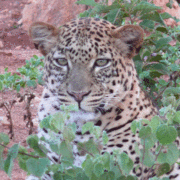
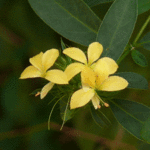

Reader Comments (3)
Oeps, trouble in paradise.......Let's hope your own CSI-work will tell you more about what's happening.
How strange - I hope KWS gets back to your quickly and lets you know what's going on. It's so sad that chemicals can be dumped into the river but I suppose there's nothing that can be done. I sincerely hope it's just algae.
Hi Audrey and Imogen - We really hope it's just algae too. Perhaps algae in itself is poisonous in high doses, apart from just depleting the water of oxygen? It doesn't quite seem to add up though...well, we'll see whether KWS is able to find out anything........?